The Censorious Society for Personality and Social Psychology
Removal of a Poster Reviewing International Pew Data on Muslim Support for Terrorism
The Short Version
At the recent Society for Personality and Social Psychology conference, the Powers that Be literally banned (censored, retracted, removed) a poster reviewing international surveys finding large proportions of Muslims support terrorism directed at Western targets, after receiving a complaint that it was Islamaphobic. They also apparently received complaints about a completely dataless poster that was titled End the Occupation Now! Free Palestine. Whether that was also taken down or not is not currently known (at least not by me).
The Long Version
The Society for Personality and Social Psychology (SPSP) hit a new low last week, when it held its big yearly conference in San Diego. Its usually a weird parade of academic stars, upncomers on the make,1 and 95% or more is just plain useless and boring (like much academic research so why should anyone be surprised?). I have gone occasionally over the years, but only when I was actually presenting something. It was just too low of a payoff just to attend. So it is hard to go down from there, but they managed it, big time.
They Banned a Poster After Accepting It
For those of you uninitiated in the ways of big psychology conferences: A “poster” is exactly that, a poster (you know, like the things kids sometimes hang in their rooms of sports or music stars etc.), but, instead of an image of Taylor Swift or Aaron Judge it is some sort of scientific report: hypotheses, method, results, that sort of thing. In a poster.
John Gaski had a poster accepted for present at the SPSP conference. We were in touch after the conference, and he indicated to me via email that he is a scholar at the Indiana Policy Review Foundation. “Why were you guys in touch?” you ask. Good question. Because they removed (i.e., censored) his poster.
I realize that is hard to see, and I am hoping that Gaski will do a guest post here with all the details. However, I can make some of the details more legible. The headline was that results from international surveys consistently find that, in many Muslim majority countries, there is majority or near majority support for terrorism. His title:
I tracked down some of his sources. These next three are from Pew in 2006. To assess his main claim “majorities/near majorities support some terrorism” you can add the Often/Sometimes and Rarely (which means “there are some circumstances”) columns.
From the Pew same report:
The vast majorities claiming they do not believe Arabs carried out the 9/11 attacks are disturbing, but I did not do a deep dive.2 Also from the same report:
A Brief Detour into Egypt on the Psychology of Support for Authoritarianism
I found the results for Egypt interesting and sad because its a country I know a little about, having visited it in 2016, and, to get ready for it, having studied up on its then-recent history. The optimism about democracy (65% in the 2006 survey) was high (at the time, Egypt was a dictatorship under General Mubarak). Then came the Arab Spring (2010-11) and Mubarak was given the revolutionary boot (2011), followed by democratic elections. Sounds good, right? The winner in the 2012 Presidential contest was Mohamed Morsi, political leader of the Muslim Brotherhood. This is how Brittanica describes the Muslim Brotherhood:
The Brotherhood’s new adherents aimed to reorganize society and government according to Islamic doctrines, and they were vehemently anti-Western.
It also represents the ideological root from which Hamas sprung. Perhaps not surprisingly, then, during Morsi’s administration, not only did Egypt’s economy tank, but there were long strings of attacks on Egypt’s Coptic Christian minority.
Here is what the New Yorker reported about Morsi:
Like other Brotherhood leaders, Morsi praised the values of democracy and freedom to members of the foreign press, but, in front of other audiences, he had a history of more troubling statements. He referred to Israel’s citizens as “killers and vampires,” and he declared that neither a woman nor a non-Muslim should be allowed to serve as Egypt’s President. As an engineer, his specialty was precision metal surfaces, but he claimed that planes alone could not have brought down the World Trade Center on 9/11. “Something must have happened from the inside,” Morsi said. For anybody attuned to Egyptian conspiracy theories, Morsi’s coded comment pointed to an obvious culprit: the Jews.
And:
In November, 2012, Morsi issued a Presidential decree to temporarily give himself powers beyond the reach of any court or judge, in order to make sure that an Islamist-dominated committee could complete a new constitution. When peaceful protesters gathered around the Presidential palace, a number of Brothers and their supporters attacked the crowd violently, in what turned out to be the final straw for many Egyptians. Morsi hung on for another six months, but, at the end of his first year in office, millions of Egyptians gathered to protest his rule, and a coup seemed inevitable. On July 3, 2013, Abdel Fattah el-Sisi, who had been appointed minister of defense by Morsi himself, led the military takeover.
When I visited in 2016, we had a local Egyptian guide. One of his parents was Coptic, the other Catholic. I asked about the military dictatorship. He supported it because, he said, it was safer and he had more freedom under the dictatorship than under the democratically elected Islamist government. I am paraphrasing from memory, but at one point he said something very close to “The people in some countries are not ready for democracy.” As an aside, this was my first inkling of understanding as to how sometimes, it could be reasonable and rational to support dictatorship over democracy. Oversimplifying just a little: If you have more freedom, safety, and economic well-being under a dictator than under a democracy, why wouldn’t you choose the dictatorship?
Some More Recent Data
I also tracked down some more recent data from Pew, this from 2014 (I underlined the places where the results were consistent with Gaski’s claim that “majorities or near majorities support terrorism against the West”).
I note that the question above does not read “the West"; instead it reads “from its [Islam’s] enemies.” So did respondents perceive the West as Islam’s enemy? Majorities in most countries viewed Islam-West relations as “bad” in the 2006 poll:
This stops a bit short of “enemy” but its in the vicinity. It was also ballpark similar in 2011, the last year for which I could find this type of data in a quickish websearch3:
Ok, so Gaski’s claims in his poster look like they have some evidentiary grounds. As usual, perhaps there are other data that are relevant that could refute his claims. If you know of any, please let me know in the comments. But his poster is certainly not on obviously weaker empirical grounds than, say, common claims about “whiteness” or “unconscious racism” or microaggressions.
Gaski also included some quotes from the Quran which on their face seem to call for brutal violence against nonbelievers. Is it “unfair” to include these in a paper on support for violence among Muslims around the world? I am not sure about that, but you can certainly see how this would trigger the Islamaphobia! accusations among the far left equalitarians who dominate social psychology. On the other hand, you can also find some pretty pungent stuff in the Bible (both old and new), so I am not sure what to make of such quotes, and I am not going to do a deep dive on religion and violence in this essay.
Is it Censorship?
Well, of course it is because there were no serious grounds for removing it other than that it pissed off SPSP sensibilities. One can argue that it should never have been accepted, but I think that’s true of much stuff published in the journals, which supposedly is a higher standard than poster presentations at conferences. Regardless, the issue here is not whether it “should” have been accepted, but whether there were scientific grounds for retraction. There weren’t. It was really a quintessential example of what we wrote about here:
There was a lot of conversation on Twitter about Gaski’s poster. You had both the Islamaphobia/bigotry! accusations and you had some folks saying they thought the paper was bad science (these were usually the same folks, which is interesting4). First I document some of this, then I get to why, even if true, those complaints do not justify censoring/retracting the paper.
And there was this (please forgive my Twypos):
And proving that, despite Twitter/X being a cesspool of partisan hostility, denunciation, and everyone I oppose is literally Hitler, sometimes, edifying conversations do take place:
What are the Standards for Retraction?
“Well,” you might be wondering, “if enough people thought the paper was bad enough or bigoted enough, isn’t it understandable why they retracted it?” It may be “understandable” (from a psychology of those in charge standpoint) but it is still not justified. The Committee on Publication Ethics has articulated a priori standards5 that justify retraction:
No one even accused Gaski of data error or fabrication. Of course, a poster is not a “publication” but, in my view, the principle should still apply. When you retract because your sensibilities are offended, it is clearly a case of censorship. When you retract because you think the science is “bad,” but there is no evidence of fraud or major error, it is also clearly a case of censorship. This is true even if you manage to get a social media mob on your side and persuade Authorities to retract. Note that COPE guidelines do not say editors should consider retracting a paper when:
there is a large social media mob denouncing the paper.
an individual claims they or someone else is “harmed” by the paper.
an individual or mob accused the paper of some sort of bigotry or something else evil.
individuals or mobs accuse the paper of doing “bad” science.
And, most critical: Even if the denouncers or mob is right, and even if the paper is both evil and terrible science, COPE provides no grounds for retraction. “If they can’t retract a poster they consider terrible,” you ask with increasing agitation, “what recourse do scientific organizations have when they make the mistake of accepting bad work?”
I know, this is very hard. So very hard. Take a minute. You can do it.
REFUTE IT YOU FUCKING PhDIDIOTS. (No, if you are reading this, I am not talking to or about you). Do … a poster at the next SPSP! Write a blog! Or a peer reviewed paper! Take to Twitter! So many ways to try to refute something you consider bad…
But It Gets Better! (Or Worse, Really)
As you can see from the above Tw/X conversations, there were many criticisms. The poster made political rather than scientific points. It had no original data. Pew data hardly counts.6 I particularly enjoyed these:
Perhaps. And yet it may also be an exquisite example of this, from The Orwelexicon:
Which gets me to another SPSP poster:
This poster has: 1. No methods; 2. No stats; 3. No data of any kind. It is pure advocacy and opinion. As per Twitter, it was also complained about but I have no information about what happened after that; perhaps it was taken down, perhaps not. The Epilogue presents a Strange Tale about what happened with this poster. In the various Twitter conversations posted above (and below), those endorsing the removal of the Pew/Islam poster were repeatedly shown this poster and repeatedly asked if they planned to raise any Hell about it. The response?
Well, it was the general response. Diogenes’ search for an honest man may have finally been satisfied though. Tom did answer when asked about whether he would raise a stink about the Occupation poster:
May Tom’s sentiments be contagious.
Epilogue
Chris Crandall, former President of SPSSI (another big professional organization for social psychologists among others), posted this on X regarding the Occupation poster:
Great that he thinks its “not OK” but was it taken down? He “thinks” so. Why does he think so? I do not know. Regardless, I received this on 2/15/24 from Gary K. Leak, a retired psychology professor formerly of Creighton University, who complained to the SPSP Ombudsperson about the Occupation poster:
Initial Email to the SPSP Ombudsperson:
From: Leak, Gary K <GARYLEAK@creighton.edu>
Sent: Friday, February 9, 2024 1:11:48 PM
To: SPSP Ombuds <ombuds@spsp.org>
Subject: OffensivePoster now has no scientific merit but only propaganda. It should not be here. Want a screen shot?
This apparently evoked no immediate response. Three days later, Gary received this:
From: SPSP Ombuds <ombuds@spsp.org>
Date: Monday, February 12, 2024 at 1:52 PM
To: Leak, Gary K <GARYLEAK@creighton.edu>
Subject: Re: OffensiveDear Gary,
Please accept my apology for the delay in response. I had technical email issues of which I wasn’t aware. Please let me know if you would like to speak by phone or Zoom to address this.
Thank you for your patience and understanding,
Kathy
Never attribute to malice that which can be just as easily explained by incompetence. I mean, an Ombudsperson for a conference without working email? Ok, but shit happens.
Gary replied:
From: Leak, Gary K <GARYLEAK@creighton.edu>
Sent: Monday, February 12, 2024 12:13:01 PM
To: SPSP Ombuds <ombuds@spsp.org>
Subject: Re: OffensiveJust curious about something: was Poster 158, Session C, the one approved-accepted for presentation, or was it switched by the presenters into something very political without the knowledge of the program committee? If it was switched I hope SPSP cares about that and would be in contact with the presenters about future presentations.
Gary Leak
Here is the response-that-isn’t-a-response from the Ombudsperson:
From: SPSP Ombuds <ombuds@spsp.org>
Date: Monday, February 12, 2024 at 2:50 PM
To: Leak, Gary K <GARYLEAK@creighton.edu>
Subject: Re: OffensiveThanks for getting back to me, Gary. I don’t have specific answers to how it went through the review process. I can relay your question and get back to you. Do you have other questions I can ask?
Thanks, again.
Kathy
Post-Epilogue
Even if the Occupation poster did not exist, and or was immediately taken down, the removal of the Gaski poster is still censorship of science by scientists, and that is the key point of this post.
Footnotes
“Delusional beliefs about 9/11 for which I did not do a deep dive.” Data are from 2006. I have no idea whether they have changed. Also, how much of this is a result of bias, ignorance, low education, living under authoritarian rule drenched in propaganda? No idea.
“Most recent international data on Muslims’ views of relations with the West from 2011.” If any of you know of more recent data directly relevant to this, please do let me know in the comments, and I will try to work it in, if I think it fits.
“The same folks complained the science was bad as called Islamaphobia!” There is some good evidence out there that if people think a finding is immoral they are also more likely to think the science that produced it is bad, than when the exact same methods produce a finding they approve of.
“A priori standards for retraction.” If you do not articulate these a priori, you are making stuff up as you go along post hoc and ad hoc. Which opens the door to all sorts of nasty biases.
“Pew data hardly counts.” This argument appears in the Twitter discussion; here is one example:
I recently found out that Brier is a grad student, who admitted on X that he only saw the Tweet of the poster, rather than the whole poster. So perhaps he can be forgiven. He is not the first person to be sucked in to giving credibility to academic misinformation provided by what is plausible called a deep fake (selective screenshots to denounce someone on grounds that are not justified, should one have full information). But he was not the only one doing this. Regardless, the idea that “we are real scientists publishing in peer reviewed journals. Pew is … merely Pew” is both presumptuous and unjustified. Pew data is often vastly superior to most of what is published in social psychology peer reviewed journals. The Pew data is not beyond criticism (some appear in the comments — I buy some but not all of these criticisms, but decided not to get pulled into such a debate). Nonetheless, the Pew data in the poster were nationally representative and international. You can count on one hand the number of social psych papers that meet that standard.







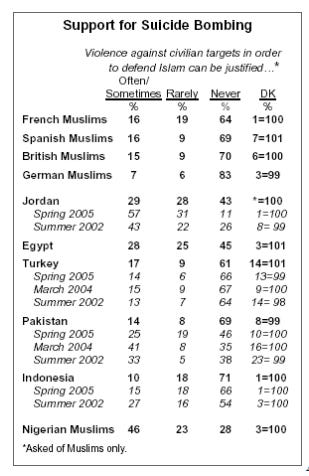
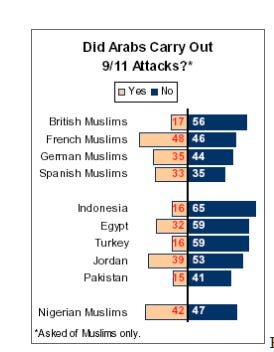









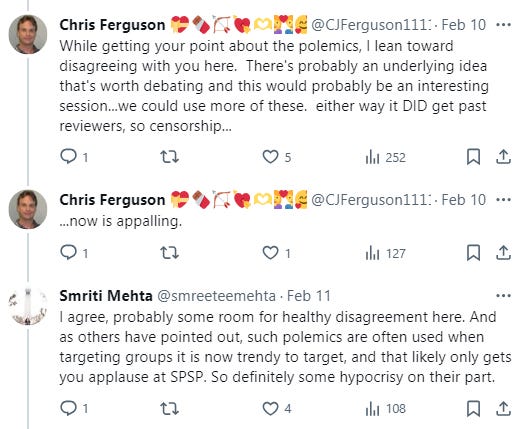




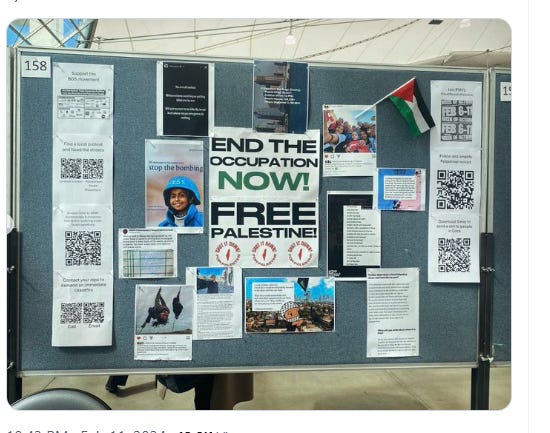



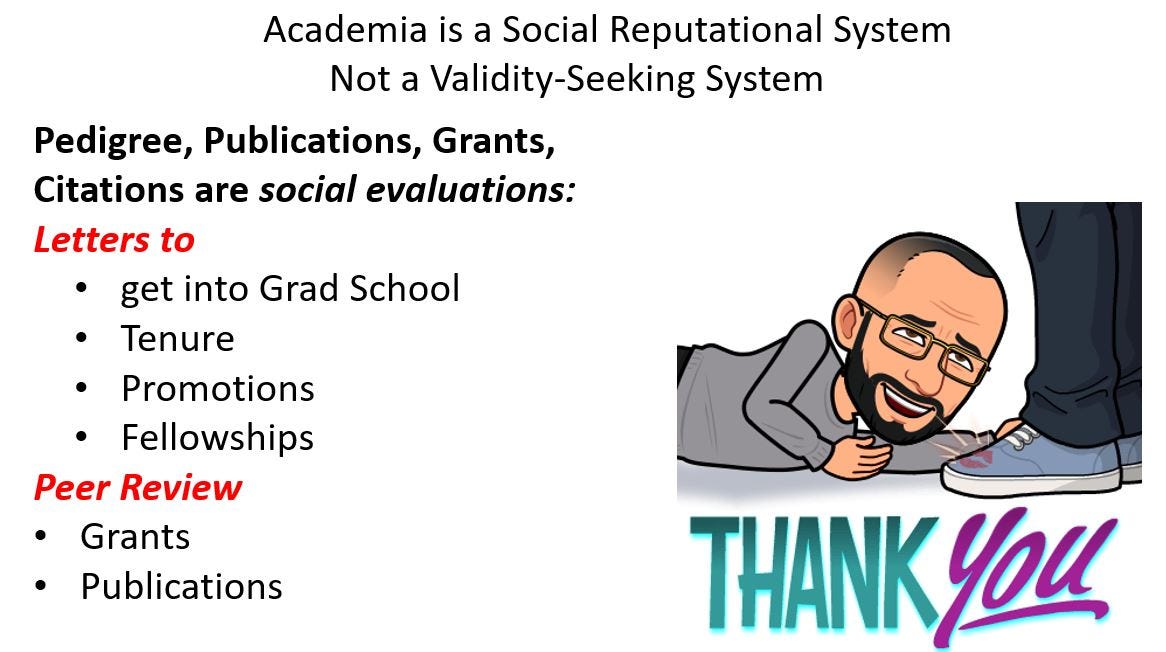

Excellent piece. I'm grateful for the information and it answered many of my questions. Censoring this poster was clearly a terrible decision. It is increasingly hard to believe that SPSP is a serious scientific organization.
My only complaint about the piece is the comment that the poster did not have "...obviously weaker empirical grounds than, say, common claims about 'whiteness' or 'unconscious racism' or microaggressions." It is hard to be worse than the theoretical bottom of a scale. Having weaker grounds than microaggression research may literally be impossible, thus setting a bar so low that no one can get under it.
On a serious note, a couple of follow-ups. (1) The only X post I could find that provided a rebuttal of the poster based on actual data (which I appreciated) cited a Pew study showing that Muslims don't support violence. Independently, I looked at a Pew 2017 report (https://www.pewresearch.org/short-reads/2017/08/09/muslims-and-islam-key-findings-in-the-u-s-and-around-the-world/), which among other things has this statement:
"More generally, Muslims mostly say that suicide bombings and other forms of violence against civilians in the name of Islam are rarely or never justified, including 92% in Indonesia and 91% in Iraq. In the United States, a 2011 survey found that 86% of Muslims say such tactics are rarely or never justified. An additional 7% say suicide bombings are sometimes justified and 1% say they are often justified."
Superficially, this seems to provide a counterpoint to the data you discuss. I suspect some of the discrepancy is in the "rarely" category. This Pew statement categorizes "rarely" as the same as "never," and your analysis (and presumably the poster's analysis, though I didn't get to read it because...it was banned) categorizes "rarely" in the "supports terrorism" category. Though it does seem clear that most Muslims disliked ISIS (for example) in the survey. Taken in total, based on what little I know so far, my read is that the data are mixed on the question, and maybe we should have a discussion about the best place to conceptually place "rarely" responses.
Is there a meta-analysis on this question? Pew aside, I know many social psychology, political psychology, and cross-cultural studies have directly or indirectly used measurements that are relevant. Has anyone summed them?
(2) Some of the twitter comments suggested that the author was a white supremacist and that his work had been "cited in the manifesto of a racist mass shooter." (https://twitter.com/Tarik_Endale/status/1756108619223851178).
Given that the term "white supremacist" has been thrown around so loosely these days, I'm not inclined to believe such an accusation (and the tweets provided no links that I could see). Further, I read some of the author's writings for the Indiana Policy Review and could see no evidence of such beliefs (quite the opposite, there were direct denials of them). But it would help everyone, I think, to give the author a chance to respond to those accusations specifically.
As a biologist who is trained in research, I would’ve rejected that poster on the merits.
The key survey questions were poorly worded and his interpretation of them problematic.
“Terrorism” is his interpretation. But that word wasn’t used in the questions. That’s sloppy at best, disingenuous at worst.
“Violence against civilians in defense of Islam” to a fanatic could mean trying to murder Salman Rushdie, or to a reasonable person could mean defending your mosque from an angry mob or shooter.
So the wording of the questions is way too vague, and to be honest seem designed to be trap questions.
Also, lumping together the “Always” and “Sometimes” response data is ill-advised as it is likely to give misleading impressions, and in light of the other faults of the presentation appears likely to have been deliberately misleading.
I don’t doubt that the conference organizers failed to thoroughly vet the poster, and I also don’t doubt that they failed to vet it in response to the complaint(s) but rejected it for purely political reasons. That doesn’t change the fact that it lacks merit.